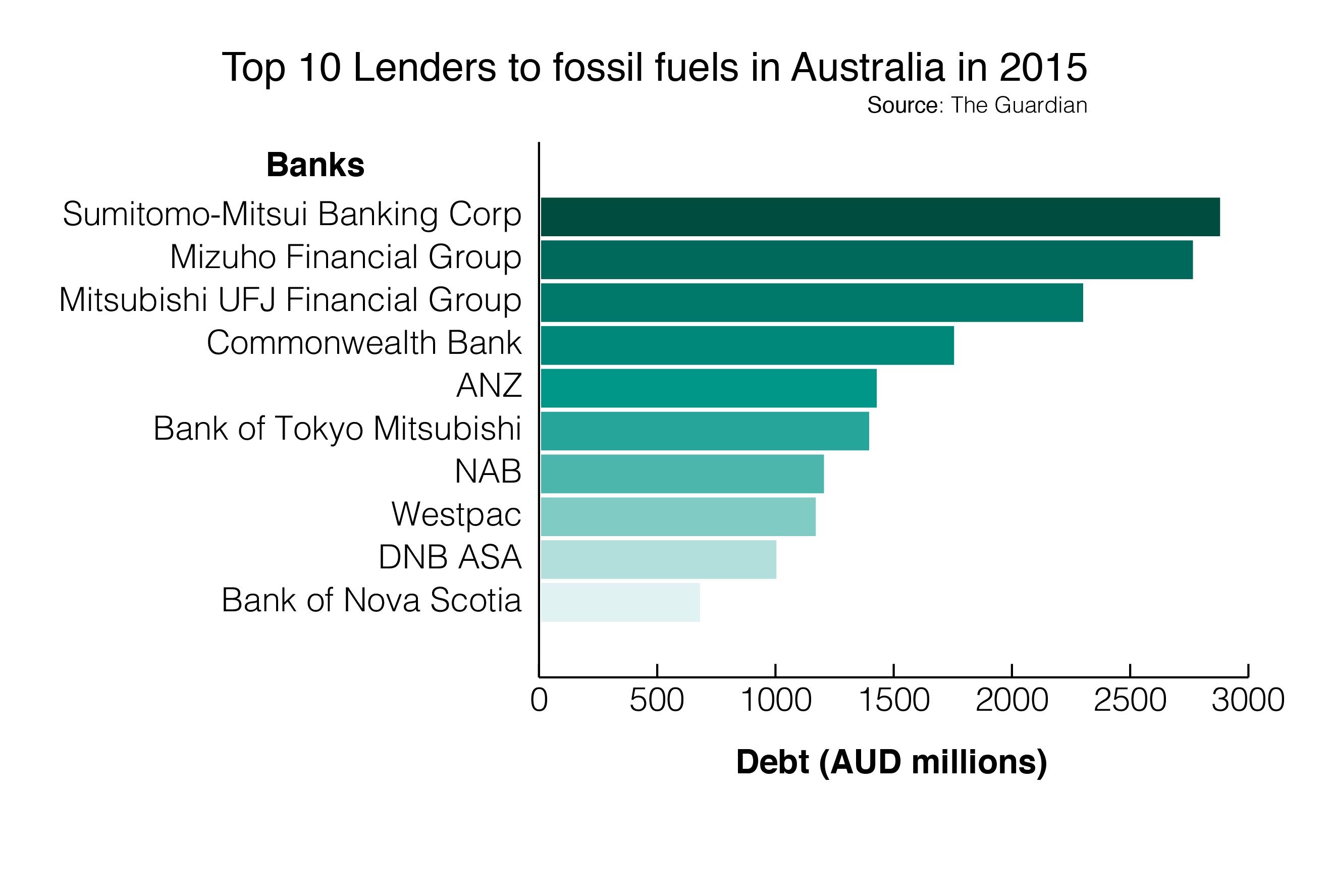Can you cut 1 Tonne of carbon pollution out of your life?
Take the challengeby Georgia Gifford
The connection between scientific research and government action appears to have a long way to go. Financial advocacy group Market Forces has revealed that the four major banks of Australia (Commonwealth, ANZ, NAB and Westpac) have approved funding for $5.5 billion of coal, oil and gas projects to go ahead in 2016.

Read more: How to tell if your bank is funding fossil fuels (and pick one that isn't)
Coincidentally, The Climate News Network have revealed in the same week that the global carbon emission quota if we are to reach the goals established in Paris last year is in fact half of what we initially thought.
Researcher from the International Institute of Applied Systems Analysis (IIASA), Joeri Rogelj, proposes that any previous estimate of the amount of carbon dioxide able to be released from 2015 onwards should be revised from 2,390 billion tons to 1,240 billion tons.
"This study shows that, in some cases, we have been overestimating the budget by 50 to more than 200 per cent. At the high end, this is a difference of more than 1,000 billion tons of carbon dioxide" said Mr Rogelj.
Long story short, if we thought cutting emissions was going to be difficult before, we didn't know what was coming. If planet surface temperatures are to rise to the 2C mark, scientists say the planet will reach 'the point of no return'. Scientists from the IIASA argue that this is exactly what will happen if we do not cut carbon emissions twice as fast as predicted.
Read more: Picking a super fund that doesn't subsidise fossil fuels.
What is Australia Doing?
In Australia, the topic of climate action is far from a new topic of controversy. It can sometimes be hard to distinguish which statistics correctly reflect Australia's climate action efforts.
While as a nation Australia produces just 1.5 per cent of global carbon emissions - a figure that appears quite low and insignificant in the scheme of things - this figure is inappropriately high for a population as small as ours.
Per capita, Australia actually has one of the worst emissions rates in the world, twice the OECD average and four times the world average.
Following the COP Paris Climate Summit 2015, the Climate Change Performance Index also ranked Australia last out of all OECD countries and third last out of all 58 countries measured for efforts on climate action, with industry experts like CSIRO's Dr John Church saying it will be 'very difficult' for Australia to deliver on promises from the COP Paris Climate Talks in 2015.
Looking at even this small taste of Australia's climate action record, it's safe to say Australia has a lot of room for improvement. The question is, are we taking measures to make this happen?
Big Business Turns a Blind Eye to Climate Change… and Economics
The answer as to Australia's efforts to reduce carbon emissions is a complex one; there are many ways in which the issue is being both addressed and ignored. For example, Australia has the highest rate of rooftop solar PV penetration in the world, as well as being by far the largest exporter of coal in the world.
Get the facts: Why we need to break up with coal.
Contradictions like this can be found consistently when studying the Australian energy, trade and private enterprise markets. Our government willingly funds renewable energy expansion, while simultaneously pouring funds and drawing profits from the nation's largest economy: fossil fuels.
Current positive efforts in terms of climate action aside, the focus on reducing carbon emissions that are largely produced by fossil fuel production needs some serious attention. This is particularly the case when we find our nation's biggest banks funding fossil fuel projects as we speak.
Moves like this make reaching current carbon reduction targets near impossible - let alone reaching the even more recent revelations that fossil fuel reduction must be doubled.
Australia's blatant push in the opposite direction becomes even more interesting amid recent international announcements that fossil fuel demand is set to drop irreversibly as other nations attempt to meet their unconditional targets from the Paris climate talks.
Analysts from Goldman Sachs have stated that "unlike other commodities, thermal coal is unlikely to experience another period of tightness ever again because investment in new coal-fired generation is becoming less common and the implied decline in long-term demand appears to be irreversible".
Adding even more to the precarious state of the international fossil fuel sector, the International Energy Agency announced late last year that six liquefied natural gas projects currently under construction in Australia are unlikely to even turn a profit.
The cumulative $200 billion worth of projects were described by the IEA's senior gas expert, Costonza Jacazio, as "unlikely to break even".
The amount of research revealing the decline of fossil fuels in the international market combined with the pressure for states to reduce their carbon emissions does not exactly support the expansion of investment in the area.
The answer as to why Australia continues to grow our fossil fuels sector in light of increasingly dire environmental, and in many ways economic conditions remains a matter of serious debate and concern.
Georgia is a a sustainable living, renewable energy, environment and fashion blogger. Her passion is encouraging an awareness of social and environmental problems – particularly how to be an informed consumer, and how to change our environmental and social impact every day. You can keep up with her on Twitter or her blog.
Photo credit: Stockergy.com
Read this next: Does climate change discriminate? The links between race, wealth and global warming.
Read this next: Does your bank support the fossil fuel industry?
